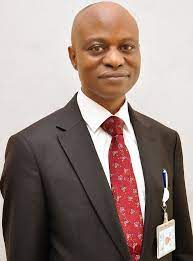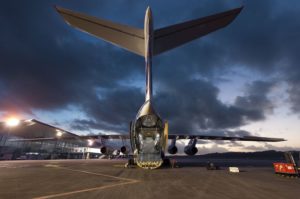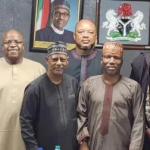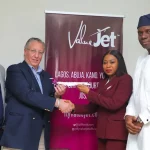
To further improve safety in Nigeria’s airspace, save money for airlines and give precise guidance to pilots, the Nigerian Airspace Management Agency (NAMA) is collaborating with the Nigerian Communications Satellite Limited (NIGCOMSAT) to expand its satellite-based navigation system known as Satellite Based Augmentation System (SBAS).
According to NAMA, the expansion will not just cover Nigeria’s airspace, but the whole of Africa airspace, which will improve precision for landing and take-off for pilots.
NIGCOMSAT is a company under the supervision of the Federal Ministry of Communications and Digital Economy, responsible for the operation and management of Nigerian Communications Satellites.
The Acting Managing Director of NAMA, Matthew Pwajok, explained during the SBAS flight demonstration at the Nnamdi Azikiwe International Airport, Abuja on Wednesday, that the Satellite Based Augmentation System means pilots using satellite systems to navigate their aircraft in the airspace.
Pwajok further explained that it would use equipment not based on the ground to guide flights, but based on satellite systems to navigate, which is akin to what NAMA had installed years ago, which is the Performance Based Navigation (PBN). He however said with NIGCOMSAT satellite, it would cover broader airspace, from Nigeria to other regional airspace that could serve the African region and beyond.
“Some years ago, Nigeria implemented what we call Performance Based Navigation, which is a satellite system for navigation and what it does is to use satellite-base system with an aircraft equipped with performance system to navigate or to fly. When the aircraft uses that with ground procedures that are developed with flight procedure design, it enables it to manoeuvre, approach and land. It can also be used for en-route whereby you provide air routes, so that after take-off, it follows what we call a standard aircraft departure that is based on satellite. That is using a satellite to develop manouvres for an aircraft for take-off to climb to the en-route phase. When it reaches the en-route phase, when you have an air route based on satellite it continues with the same satellite system to also fly from one point to the other. So the satellite-based navigation system covers all phase of flight,” Pwajok said.
He also explained that performance based navigation provides the pilot with lateral guidance and improves accuracy, the integrity, the availability and continuity of the signal for the pilot.
“So what is now required is to put a ground infrastructure, a monitoring system, a control system or a master station that receives signals from several satellites, triangulate them and take the best location or find a space induction or signal and now broadcast it through a broadcast media worldwide or globally and it will be reviewed by any aircraft that is flying within that vicinity and use it now for more precision. So, we have done performance base navigation that provides general lateral guidance for pilots to locate airports. We now want to improve on it to do what we call precision approaches,” Pwajok also explained.
He disclosed that the system has been in use in Europe, the US and other parts of the world and Nigeria had embraced the system through NAMA performance based navigation but now wants to expand the system in collaboration with NIGCOMSAT.
Since the new satellite system from NIGCOMSAT covers the African airspace, NAMA is collaborating with Agency for Aerial Navigation Safety in Africa and Madagascar (ASECNA), which provides airspace management services to French speaking countries in West Africa and beyond, including 16.1 million square kilometres of airspace covering six Flight Information Regions – Antananarivo, Brazzaville, Dakar Oceanic and Terrestrial, Niamey and N’Djamena.
“Our sister agencies from ASECNA states are also here. Europe is here, America is here and so on. In collaboration with International Civil Aviation Organisation (ICAO), we are all going to monitor and see. When we are able to see that the signal has transmitted, received, augmented and re-transmitted, it can guide aircraft precisely, an improved accuracy, an improved landing, approved takeoff and climb, then we will be able to now say yes, we can work towards implementation like the rest of the world. So the satellite-based navigation system is a very important milestone,” Pwajok said.
THISDAY also spoke to the Director of Operations, ASECNA, Bakienon Louis, who was in Abuja for the demonstration and who explained that he was in Nigeria for the demonstration of the capability of the navigation based on satellite in Africa.
“We have designed what we need for that to put in some ground stations a new satellite. And these signals coming from these stations will be found in all airports, you don’t need to have specific equipment on ground to use it. So this is the demonstration we all are going to do here to show the possibility in Africa, like what is on-going in America and Europe. And at that time, you don’t need to implement ground equipment again.

He explained that NIGCOMSAT is providing the satellite, which would provide the signal for all Africa.
“The signal (from NIGCOMSAT) covers all Africa. It is geo satellite and it is only the payload on the satellite, which connects all the continents. That is why are making this demonstration with NAMA and NIGCOMSAT. NAMA provides the air traffic services and NIGCOMSAT provides the satellite. They are hosting the payload, which provides the signal for Africa. NAMA will use the signal, which comes from this satellite,” the Director of Dakar based ASECNA said.
He also explained that what is important is the signal.
“The signal is everywhere in all countries. Now what is needed for Africa, what we are doing today is a joint partner between Nigeria and some countries of ASECNA. They will own the signal; we have other countries coming inside to be partner of this to own the signal and then the signal will be provided to everybody. We think it can be an African body like African Union which can govern this signal for all the countries,” he said.





